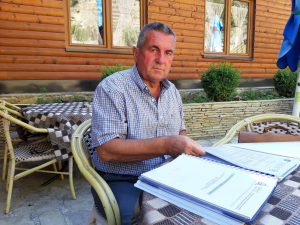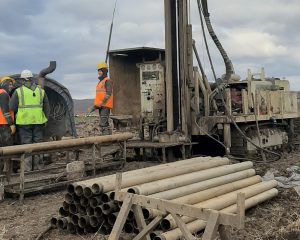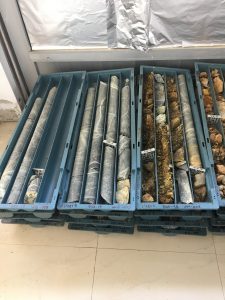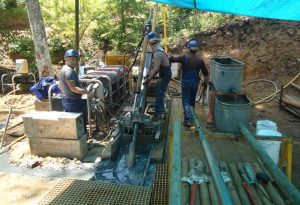Kosovo’s natural resources have always been seen as a potential driver for the country’s emerging economy, but numerous governance and legislation issues have made investing in the sector almost impossible.
In 2010, the Turkish investor Li-Kos was granted all ten licenses and authorizations required to begin roof tile production in the village of Fortese in Rahovec, using resources excavated from the local region. An investment of 19 million euros was foreseen, including the construction of a new factory, which was expected to employ 120 people.
The Turkish investors began installing equipment in the area, but experienced resistance when starting to construct the new factory. “When it came to building the factory, we were subject to physical assaults from some residents of the village, in the presence of the police,” recalls Xhemil Luma, then director of Li-Kos.
The factory was never built, and, in addition to the authorizations and licenses, Luma now has a police report on the assault, as well as a lawsuit filed seeking compensation for the investments made. According to Luma, both the police and the municipality seemed unwilling to help the investors.
Haziz Krasniqi, a spokesperson for the Municipality of Rahovec, insisted that the local authority conducted consultations with the residents of the village before awarding the permits, and that disputes against the project arose later.
The head of the Fortese village council, Besnik Popaj, says some of the villagers protested against the Turkish investor on the grounds that the project could endanger the health of the local population. “It is true that this project got the green light from the Municipal Assembly of Rahovec,” Popaj explains. “However the residents are afraid of the potential contamination the construction of this factory may cause.”
According to Popaj, officials from the Ministry of Environment and Spatial Planning warned the residents that mazut – a heavy, low quality oil based fuel – would be used at the factory, and despite assurances that filters would be used on the emissions, this was not enough to allay the fears of the residents.
Popaj also reveals that the residents were divided over the project, with some in favor and some against, and confirms that Luma was attacked by some residents during a protest in the village.
The Turkish company is now claiming the right to compensation from the state for the investments made, which, according to Luma, are estimated to be nearly half a million euros. After the Basic Court of Prishtina decided against Li-Kos in October 2017, the case is with the Court of Appeals. Despite the fact that several years have already passed, the case has still not yet received a final verdict, a victim of a large backlog of cases before the appeal court.
Arber Jashari, a spokesperson from the Court of Appeals, says that the case was received at the end of 2017 and is on a waiting list, but could not give a timeline for when the case will be resolved. According to Jashari, there is currently only one judge working at the court, which has led to a backlog of cases.
“We are currently handling about 450 cases of an economic nature with roughly 100 from 2017,” he tells BIRN. “The Court of Appeals is working intensively to reduce the backlog of cases, giving priority to older and fast-tracked cases.”
Failure to attract investment
Luma is not alone in his difficult experiences investing in Kosovo’s natural resources. BIRN has discovered that many companies interested in utilizing the country’s rich mineral deposits have faced problems that have prevented them from investing and creating new jobs.
There are 43 foreign companies in this field with a current interest in investing in Kosovo, but only four are equipped with licenses for the extraction of mineral resources: SharrCem, NewCo Ferronikeli, AZ group and Esha Materials. The other 39 companies have been permitted to research areas for their mining potential, but not extract the minerals.
A delegation from Kosovo’s Independent Commission for Mines and Minerals, ICMM, travels to Toronto, Canada and London, UK every year to attend international conferences with the purpose of attracting serious investors. BIRN asked ICMM’s Director Ramiz Krasniqi about the number of investors they have brought to Kosovo as a result of attending these conferences. He mentioned the name of only one company.
“After attending these conferences, we were visited by companies interested in investing in Kosovo,” Krasniqi says. “There are companies that have conducted research and are still doing so.”
The lack of investment in this sector demonstrates successive governments’ failure to implement the 2010-2025 Mining Strategy. According to this strategy, adopted in 2010 by the PDK-LDK coalition government led by Hashim Thaci, the exploitation of all mineral resources over a period of 25 years was projected to be worth over 7.6 billion euros and create opportunities for 20,000 new jobs.
Many experts in the field point to a problem in legislation as one cause for the lack of investment. The ICMM is responsible for granting licenses for the exploration and extraction of mineral resources. However, according to Krasniqi, it is almost impossible to invest in mining in Kosovo due to legislation conferring direct powers to the Kosovo Government.
Article 18 of the Law on Mines and Minerals states that “any Exploration or Mining related to an Energy Mineral or to a mineral located within an area that is designated as an Area of Special Interest in accordance with paragraph 2 of this article shall be awarded and issued only after the conduct of an open, transparent and competitive bidding process.”
Investments in Areas of Special Interest can therefore only be made following a tender opened by the Kosovo Government. The same article of the Law on Mines and Minerals foresees that the tendering process is overseen by a committee made up of representatives from five ministries: the Ministry of Energy and Mining, (now part of the Ministry of Economic Development), the Ministry of Economy and Finance, the Ministry of Trade and Industry, the Ministry of Environment and Spatial Planning, and the Ministry of Labor and Social Welfare.
These legal provisions are especially obstructive to investment in the mining sector given that the Kosovo Government has classified 11 localities as Areas of Special Interest, a decision taken in 2008 by the former Ministry of Energy and Mining.
Areas of Special Interest have been designated in: Vllahi-Zjaqe, Gumnishte, Karaqe, Zhegovce, Bresalce, and Bushnice-Bolec, where there are deposits of lead and zinc, in Baks, Magure and Terstenik where there are deposits of nickel, alongside copper, iron, and magnesium respectively, in Deva where they are deposits of chrome, and in Debellde where there are rare minerals including quartzite.
Collectively, these areas comprise a substantial part of Kosovo’s mining potential. According to Mentor Demi, a member of the Federation of European Geologists, none of these 11 areas have ever been the subject of a bid for investment.
Investments halted by the state itself
BIRN has accessed exclusive documents detailing a lack of political will to facilitate the investment process in these areas. Correspondence between the Office of the Prime Minister and the Ministry of Economic Development, MED, shows that in early 2018, Minister Valdrin Lluka made efforts with Prime Minister Ramush Haradinaj to deregulate some of these areas.
In a draft decision dated February 23, 2018, Lluka urged Haradinaj to unblock at least four of the 11 protected areas: Vlahi Zjaqe, Gumnishte, Karaqe, and Bresalce. Five days later, on February 28, 2018, the proposal of Minister Lluka was on the agenda of the government meeting under the heading: “Review of Proposal Decision on Opening Competitive Procedures for Areas of Special Interest (MED).”
However, according to the minutes of this meeting, seen by BIRN, Haradinaj requested to postpone this matter for another meeting. “We are at issue number 15 of the agenda, but prior to dealing with this issue I have two requests to postpone this issue for another meeting,” Haradinaj is quoted as saying in the minutes of the meeting.
The outgoing prime minister stated that he needed the consent of the whole cabinet for this matter, but the item never appeared on the agenda for any future meeting of the cabinet.
BIRN addressed the Office of the Prime Minister enquiring why the proposal of Minister Lluka did not get the green light. Donjeta Gashi, a spokesperson for the Government, recommended referring to the official response given by the prime minister at the government meeting.
Zero investment through the Law on Strategic Investments
Geologist Mentor Demi believes another problem in the sector is the Law on Strategic Investment. While this law bypasses current legislation to pave the way for investment in the sector, Demi says the law has its shortcomings, and as a consequence no investor has yet been able to qualify as being “strategic.”
Through this law, each investor in the mining sector is required to have a maximum bank guarantee of 10 per cent of the total investment amount, which is foreseen to be negotiated with the government. “This leaves room for manipulation,” Demi says, adding that the same law would require investors to invest a minimum of 30 million euros over a five-year period, which he believes is an unnecessary stipulation.
These criteria appear to have discouraged potential investors. Data provided by the Ministry of Trade and Industry, MTI, shows that so far a total of 26 companies have applied to become a strategic investor. Out of these, only four are from the mining sector. The MTI did not clarify whether any of these companies had acquired the status of strategic investor despite BIRN’s questions on the subject.
Kosovo Forest Agency has ‘its own criteria’
When an investor obtains an ICMM license, it also needs an authorization from the Kosovo Forest Agency, KFA, and BIRN has discovered that the KFA has a great deal of discretion in terms of the area and duration of the permits issued.
According to the Law on Mines and Minerals, licenses for extracting energy minerals can be issued for a period of 30 years with the possibility of extension for another 15 years. For all other minerals, these licenses are valid for up to 25 years and can also be extended for an additional 25 years.
Nevertheless, BIRN has found that the KFA is much more restrictive in the licenses it authorizes. According to an administrative instruction, unlike the ICMM, the KFA limits the duration of the authorizations to only five years, while investors also often receive an authorization to mine within an area of only five hectares.
According to ICMM director Ramiz Krasniqi, this issue is causing a lot of problems for investors as, according to Krasniqi, a mine cannot be developed on an area of five hectares. “Many companies were forced to create additional businesses because they are not authorized to exceed five hectares when the land is managed by the KFA,” he says.
Besim Zogu, Director of the Central Inspection Directorate at the KFA, confessed that this restriction to just five hectares is disadvantageous to investors, but argued that the KFA is only implementing the law. “The restriction on awarding contracts beyond five hectares, which we are convinced may not be advantageous to investors, arises from the Law on Agricultural Land,” he says.
The Kosovo Chamber of Commerce, KCA, has raised this issue several times, stating that local companies that have invested in the mining sector are suffering. The KCA has provided BIRN with all the documents they have delivered to the institutions regarding this problem. In addition to the divergence in criteria, the KCA documents state that local businesses have experienced a number of other problems.
Each mine needs a minimum of 20 to 25 hectares and the companies must pay 40,000 to 100,000 euros per year in rent. “Given that these companies do not use this area for work but for extracting various minerals, which they pay to the ICMM based on what they extract, we consider the rent unnecessary and extremely high,” reads a letter sent by the KCA to Kosovo’s state institutions, dated June 21, 2019.
Trepca and Kosovo’s dormant mines
Kosovo’s difficulties in attracting investment in its natural resources is perhaps best represented by its most renowned company, Trepca. The area is rich in minerals. At the Stan Terg mine, including its surrounding settlements, there are over a million tons of lead, a million tons of zinc and over 2.5 million tons of silver.
On October 7, 2016, the Law on Trepca passed through the Kosovo Assembly, defining the company as a joint stock company, with 80 per cent of the shares remaining with the Government and the other 20 per cent the property of the employees.
Soon after, the Trepca Charter was approved, which states that some of the 11 Areas of Special Interest were to be managed by the enterprise. According to the charter, other mines may also join the Trepca Joint Stock Company in the future. The charter also requires the ICMM to stop issuing any licenses to economic operators on sites under the jurisdiction of Trepca.
Although issues over ownership now seem resolved, Trepca continues to face financial difficulties. Trepca has never been able to keep itself afloat with profits from its own production in the post-war period, and has received subsidies from the Kosovo Government every year since 2007 – the Stan Terg mine alone has received around eight million euros.
In the meantime, the company has not invested in the depreciated mining and flotation sector and has incurred additional production costs.
According to experts in the mining sector, the problems at Trepca are blocking investment in other parts of Kosovo with subterranean assets.
Gani Maliqi is a geologist and professor at the Faculty of Geosciences in Mitrovica, who previously represented Peshter Mining JSC, a Canadian-Australian company that Maliqi claims invested 8 million euros in research into lead and silver in Kosovo, but have not been granted a licence for extraction.
Maliqi believes that Kosovo’s underground wealth has so far been dormant. He particularly emphasizes the importance of Trepca, which manages areas with the highest mining potential in the country.
“In order for the mining sector to succeed, there must be a solution to the problem facing Trepca, which in terms of production is the backbone of mining in Kosovo,” Maliqi says. “If mining assets are not focused on servicing the economy, they are dormant.”
This publication has been produced with the assistance of the European Union. The contents of this publication are the sole responsibility of Agon Sinanaj and can in no way be taken to reflect reflect the views of the European Union or BIRN and AJK.










